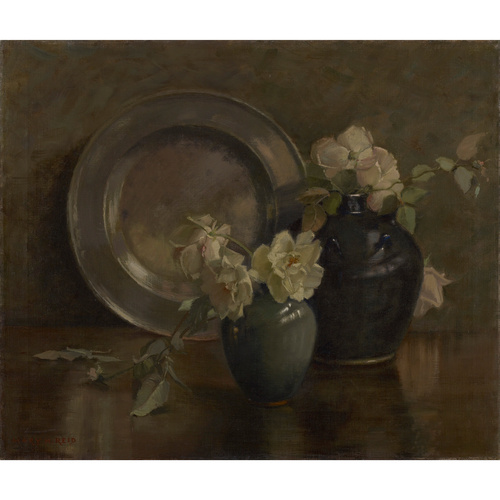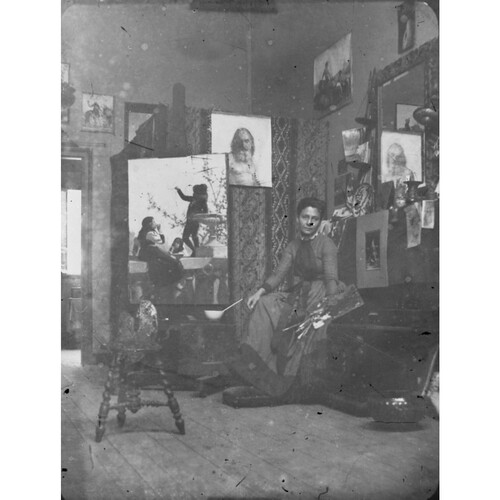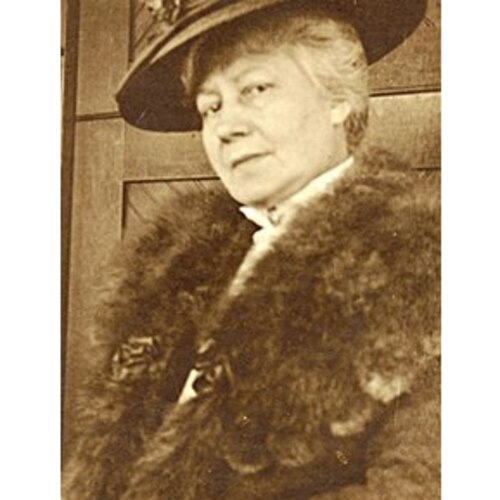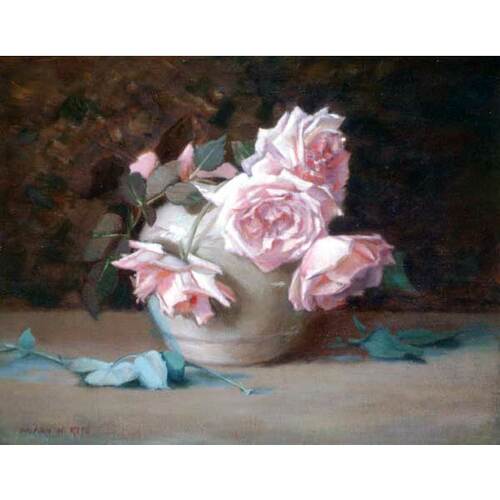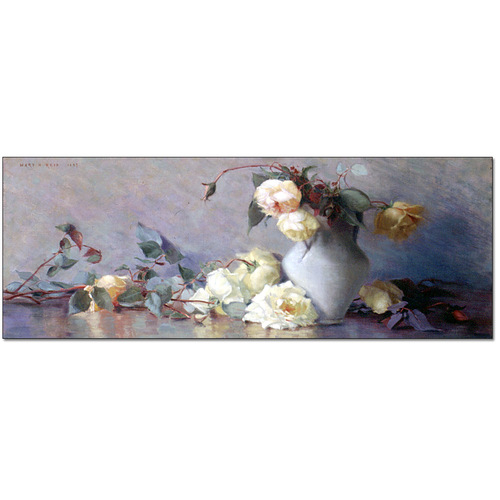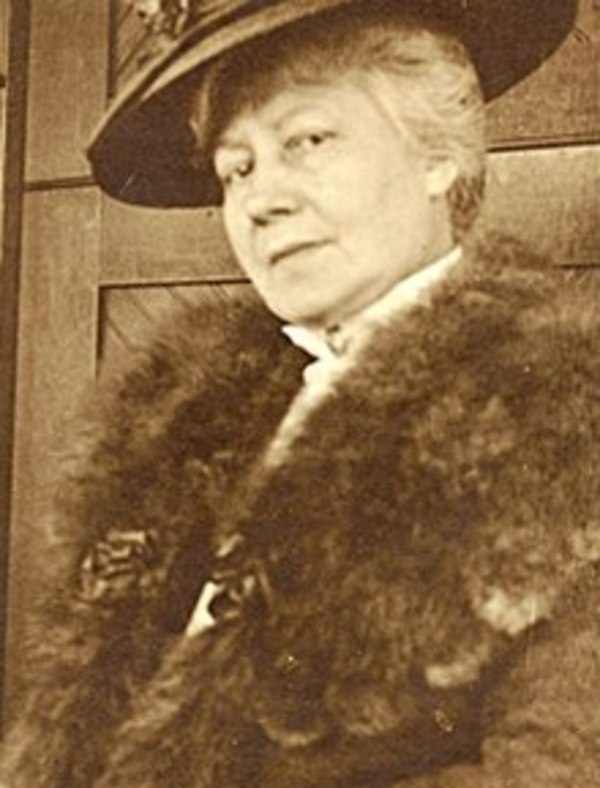
Source: Link
HIESTER, MARY AUGUSTA CATHARINE (Reid), artist; b. 10 April 1854 in Reading, Pa, daughter of John Philip Hiester, a physician, and Caroline Amelia Musser; m. 13 May 1885 George Agnew Reid* in Philadelphia; they had no children; d. 4 Oct. 1921 in Toronto.
Mary Hiester’s ancestors emigrated from Germany to the United States in the mid 18th century. Her father died when she was an infant, and about 1863 her mother took Mary and her sister, Caroline, to live with relatives in Beloit, Wis. After her mother’s death in November 1875, Mary returned to Pennsylvania, where she lived in Reading with a cousin’s family. She then attended the Philadelphia School of Design for Women in 1881–83 and enrolled (most likely on a part-time basis) at the Pennsylvania Academy of the Fine Arts in 1883–85, in classes taught by Thomas Pollock Anshutz and Thomas Eakins. It was at the academy that she met Canadian artist George Reid, a fellow student, whom she married in 1885.
The Reids honeymooned in Europe for four months, visiting London, Paris, Italy, and Spain. In Málaga they saw Mary’s sister, who had converted from the family’s Lutheran faith to Roman Catholicism and become a nun. On their return they settled in Toronto and established a studio at 31 King Street East, where they gave art lessons. The couple moved, probably in 1888, to quarters in the Toronto Arcade building on Yonge Street, in 1901 to a house on Indian Road, and finally in 1907 to Upland Cottage, a house designed by George in Wychwood Park, a pastoral community north of Toronto. In the spring of 1888 an auction of their work had raised enough money to finance a second trip to Britain and France, in 1888–89. Mary Reid enrolled in the Académie Colarossi in Paris, taking costume-study and life classes under Joseph Blanc, Pascal Dagnan-Bouveret, Gustave Courtois, and Jean-André Rixens. She studied there again in 1896, when the couple made an extensive tour of Gibraltar and Spain, which she described in three articles in Massey’s Magazine (Toronto). They would make two more trips to Europe, in 1902 and 1910. In addition, the Reids spent every summer from 1891 to 1916 at Onteora, a private literary and artistic club in the Catskill Mountains near Tannersville, N.Y., where they had a house and a studio, both designed on arts and crafts principles by George. They spent their time painting and teaching, their studio having accommodation for ten students, some of whom came from as far away as Toronto.
Reid’s oeuvre consists almost exclusively of easel paintings and a few surviving watercolours, but also includes a small number of marouflée landscape murals. The most admired of these murals was a view of the Humber River done for the town hall of Weston (Toronto) in 1912–13. She was, however, best known as a painter of floral still lifes, and by 1890 she was widely considered the pre-eminent flower painter in Canada. Critics particularly liked her sophisticated infusion of “character” into the straightforward botanical accuracy emphasized by most of her Canadian predecessors in this genre. As well, she regularly exhibited paintings of gardens, meadows, and other domesticated landscapes, night scenes, and, less frequently, studio interiors and figure studies. Along with a superficial examination of Impressionism, especially in her work of the 1880s and 1890s, she developed an enduring interest in a restricted range of colours to evoke a poetic subjectivity in her paintings, as in A study in greys, done about 1913. These were characteristics of the tonalist aesthetic found throughout North American art of the late 19th and early 20th centuries. Reid’s attraction to such a palette was reinforced by the paintings of Diego Velázquez, which she had studied and admired in Madrid in 1896. Her work also incorporated elements from the aestheticism of American artist James Abbott McNeill Whistler. These included oriental motifs, which sometimes appear in her still lifes and interior scenes, for example in Chrysanthemums: a Japanese arrangement (painted around 1895), and the occasional use of titles to suggest parallels between visual art and music, as in her Harmony in grey and yellow (1897). More than most contemporaries, Reid produced work that exemplified the decorative sensibility that was also prevalent in North American art. In this respect she was supported by critics such as Hector Willoughby Charlesworth* of Saturday Night, who described Reid’s paintings as “exquisitely refined.” In explaining the idealized feminine sensitivity that he found in her works, however, he resorted to stereotype, emphasizing that she was a model of humble and gracious womanliness – the perfect helpmate to her more famous husband. Reid said or did little to contradict this image. “Nothing can tempt her to talk about her pictures,” Marjory Jardine Ramsay MacMurchy* wrote in the Globe in 1910. Yet Reid clearly saw herself as a professional artist. This perception would be echoed in a memorial poem published in 1921 in the Daily Mail and Empire and reprinted in the Canadian Theosophist (Toronto): “Lived she to work and bless; / This was her heart’s delight.” In the absence of firmer documentation, however, little else can be said of Reid personally, and the two major portraits of her by her husband provide only tentative clues.
Reid had entered the artistic establishment of Toronto soon after settling there. Elected a member of the Ontario Society of Artists in 1887, in 1907 she became only the second woman to serve on its executive committee. She was elected an associate of the Royal Canadian Academy of Arts in 1893 and a member of the Canadian Society of Applied Art in 1904. Although, in both Toronto and Onteora, she gave lessons to students, among them Mary Matilda (May) Riter Hamilton, her reputation was principally based upon her exhibited work. She contributed to the annual exhibitions of the OSA and the RCA almost every year between her arrival in Canada and her death, and participated in selected annual exhibitions at the Art Association of Montreal, the Women’s Art Association of Canada, and the Canadian National Exhibition. She also showed at the Columbian exposition in Chicago (1893), the Pan-American exposition in Buffalo (1901), and the Louisiana Purchase exposition in St Louis (1904), with Mary Evelyn Wrinch at the galleries of the Art Metropole in Toronto (1912), and with her husband and Wrinch at the Royal Ontario Museum, in aid of the Red Cross Society during wartime (1915).
Following George’s appointment in 1912 as principal of the Ontario College of Art, Reid, a member of its board, actively supported its development and life. She had been a fixture of the Toronto art scene for three decades when, in 1919, she began suffering from angina. At the time of her death two years later, many of her paintings were owned by private collectors and others had been acquired by the National Gallery of Canada and the government of Ontario. In 1922 a large retrospective was organized at the Art Gallery of Toronto, the first solo exhibition given there to a woman, and it was enthusiastically praised in the press. By then, however, the visual aesthetic embodied in Reid’s art was becoming dated as Canadian artists moved on to new concerns.
Mary Hiester Reid’s articles on her tour of Gibraltar and Spain were published, with illustrations by her husband, in Massey’s Magazine (Toronto), 1 (January–June 1896): 297–308, 373–84; 3 (January–June 1897): 375–83. Two important portraits of her were painted by her husband: Portrait of Mary Hiester Reid (1885) at the National Gallery of Canada (Ottawa) and Mary Hiester Reid (1898) at the Art Gallery of Ontario (Toronto). In addition, she is pictured in George A. Reid’s Reverie (c. 1885) at Museum London (London, Ont.), Mortgaging the homestead (1890) at the NGC, and Sketch portraits of GAR and MHR (1896) at the AGO. Her paintings A study in greys and Chrysanthemums are located at the AGO, and Harmony is in the Government of Ontario Art Coll., which was transferred to the AO in 2001. Other works by her are in the NGC, Museum London, the Robert McLaughlin Gallery (Oshawa, Ont.), the Agnes Etherington Art Centre, Queen’s Univ. (Kingston, Ont.), the Art Gallery of Windsor, Ont., the Art Gallery of Hamilton, Ont., and the Edmonton Art Gallery.
Art Gallery of Ontario, Research Library and Arch., C. W. Jefferys papers, C. W. Jefferys, “The art of Mary Hiester Reid”; George Reid scrapbook. AO, F 1140, minute-books; RG 22-305, no.43899. Moore College of Art and Design (Philadelphia), Philadelphia School of Design for Women, student registration records. Pennsylvania Academy of the Fine Arts (Philadelphia), Records, school reg. of students, 1884–85 (mfm. in Arch. of American Art, Smithsonian Institution (Washington), reel no.62: 221–36); student reg. in antique and life classes, 1858–84 (reel no.62: 666–89). Daily Mail and Empire, 11 Oct. 1921. Farmers’ Sun (Toronto), 24 Oct. 1922. Globe, 16 July 1910. Art Gallery of Toronto, Memorial exhibition of paintings by Mary Hiester Reid, 1922 (Toronto, 1922). Canadian Farmer, Dairyman and Stockbreeder (Toronto), 30 Dec. 1922: 24. Canadian men and women of the time (Morgan; 1912). Canadian Theosophist (Toronto), 2 (1921–22), no.10: 144. V. E. C[lymer] Hill, A genealogy of the Hiester family (Lebanon, Pa, 1903). Directory, Toronto, 1887–1910. Brian Foss and Janice Anderson, Quiet harmony: the art of Mary Hiester Reid (exhibition catalogue, AGO, 2000). E. D. Gaillard, Onteora: hills of the sky, 1887–1987 (n.p., 1987). Madge MacBeth, “Canadian women in the arts,” Maclean’s (Toronto), 27 (1914), no.12: 23. Muriel Miller Miner, G. A. Reid, Canadian artist (Toronto, 1946; rev. ed., George Reid, a biography, ed. I. R. Coutts, 1987). M . L. Montgomery, History of Berks County in Pennsylvania (Philadelphia, 1886), 595–96. Saturday Night, 19 Nov. 1898, 15 Oct. 1921, 21 Oct. 1922.
Cite This Article
Brian Foss, “HIESTER, MARY AUGUSTA CATHARINE (Reid),” in Dictionary of Canadian Biography, vol. 15, University of Toronto/Université Laval, 2003–, accessed January 19, 2025, https://www.biographi.ca/en/bio/hiester_mary_augusta_catharine_15E.html.
The citation above shows the format for footnotes and endnotes according to the Chicago manual of style (16th edition). Information to be used in other citation formats:
| Permalink: | https://www.biographi.ca/en/bio/hiester_mary_augusta_catharine_15E.html |
| Author of Article: | Brian Foss |
| Title of Article: | HIESTER, MARY AUGUSTA CATHARINE (Reid) |
| Publication Name: | Dictionary of Canadian Biography, vol. 15 |
| Publisher: | University of Toronto/Université Laval |
| Year of revision: | 2005 |
| Access Date: | January 19, 2025 |


